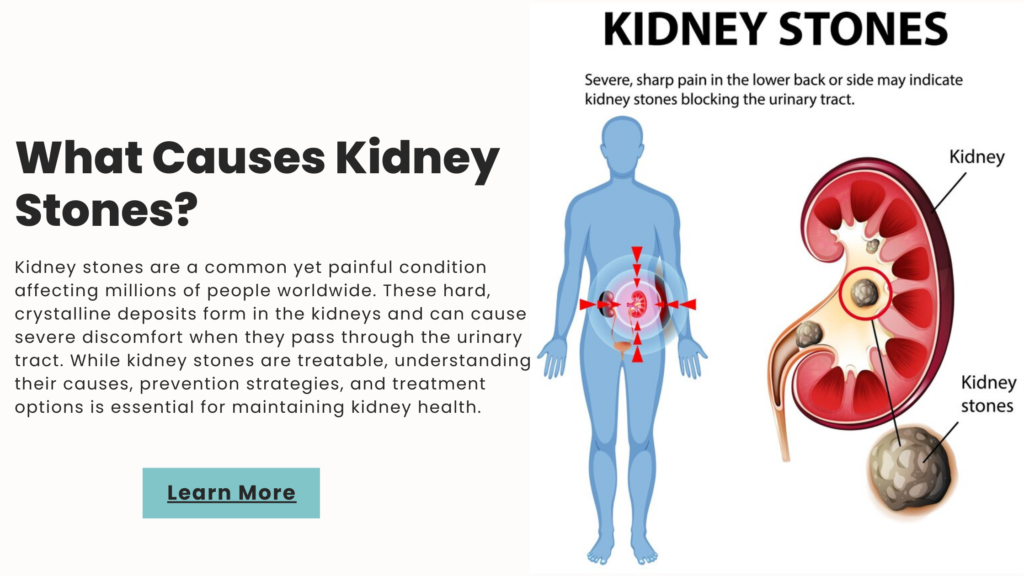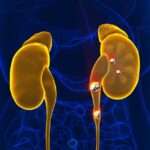
What Causes Kidney Stones?
Kidney stones are a common yet painful condition affecting millions of people worldwide. These hard, crystalline deposits form in the kidneys and can cause severe discomfort when they pass through the urinary tract. While kidney stones are treatable, understanding their causes, prevention strategies, and treatment options is essential for maintaining kidney health.
What Are Kidney Stones?
Kidney stones are solid masses made up of crystals that form in the kidneys. These stones develop when certain substances in the urine, such as calcium, oxalate, and uric acid, become concentrated enough to crystallize. Over time, these crystals grow into stones of varying sizes.
How Do Kidney Stones Form?
The primary cause of kidney stone formation is an imbalance in urine composition. When urine contains more crystal-forming substances, like calcium or oxalate, and less fluid to dilute them, stones start to form. Dehydration, poor dietary habits, and certain medical conditions can accelerate this process.
Types of Kidney Stones
There are four main types of kidney stones, each with distinct causes and characteristics:
1. Calcium Oxalate Stones
These are the most common type of kidney stones. They form when calcium combines with oxalate in the urine. Factors like excessive intake of oxalate-rich foods (e.g., spinach, beets, almonds) and dehydration contribute to their formation.
2. Uric Acid Stones
Uric acid stones develop when urine becomes overly acidic. High consumption of purine-rich foods like red meat, organ meats, and shellfish increases the risk.
3. Struvite Stones
These stones are commonly associated with urinary tract infections (UTIs). Bacteria produce ammonia, leading to the formation of struvite stones.
4. Cystine Stones
A rare genetic disorder called cystinuria causes these stones. They form when excessive cystine leaks into the urine.
Common Causes of Kidney Stones
1. Dehydration
Lack of sufficient water intake is one of the leading causes of kidney stones. When urine becomes highly concentrated, it allows minerals and salts to crystallize.
2. Diet Choices
A diet high in sodium, animal protein, and oxalate-rich foods increases the likelihood of kidney stone formation.
3. Obesity
Being overweight can alter urine composition, raising the risk of kidney stones.
4. Family History
Genetics play a role; if a close family member has had kidney stones, your risk increases.
5. Certain Medical Conditions
Conditions like gout, diabetes, and hyperparathyroidism can contribute to stone formation.
Symptoms of Kidney Stones
Symptoms vary depending on the size and location of the stone but commonly include:
- Severe back or abdominal pain
- Blood in urine
- Frequent urination
- Nausea and vomiting
- Burning sensation during urination
How Are Kidney Stones Diagnosed?
Doctors use imaging tests like ultrasounds, CT scans, and X-rays to diagnose kidney stones. Urine and blood tests are also performed to identify underlying causes.
Treatment Options for Kidney Stones
1. Hydration and Medication
Small stones can often pass naturally with increased water intake and pain management medications.
2. Shock Wave Lithotripsy (SWL)
This non-invasive treatment uses sound waves to break larger stones into smaller pieces, allowing them to pass through urine.
3. Ureteroscopy
A thin tube is inserted through the urethra to locate and remove stones.
4. Surgery
For large or complicated stones, surgical intervention may be required.
Preventing Kidney Stones
1. Stay Hydrated
Drink at least 8-10 glasses of water daily to keep urine diluted.
2. Monitor Diet
Reduce intake of salty, processed foods, and oxalate-rich items.
3. Consume Calcium-Rich Foods
Dietary calcium binds with oxalates and reduces stone formation.
4. Limit Animal Protein
Excessive meat consumption can raise uric acid levels.
Lifestyle Changes for Kidney Stone Prevention
- Maintain a healthy weight
- Exercise regularly
- Avoid sugary drinks and sodas
- Follow a balanced diet like the DASH diet
When to See a Doctor
Seek medical attention if you experience severe pain, persistent nausea, or blood in your urine. Early intervention can prevent complications.
Conclusion
At Aapkacare , we understand the pain and discomfort caused by kidney stones and are committed to offering affordable treatment options. With our team of expert doctors and surgeons, we ensure a 30-minute procedure, minimal pain, and complete insurance support. Don’t let kidney stones disrupt your life—book an appointment today with Aapkacare Health and experience quality healthcare tailored just for you.



